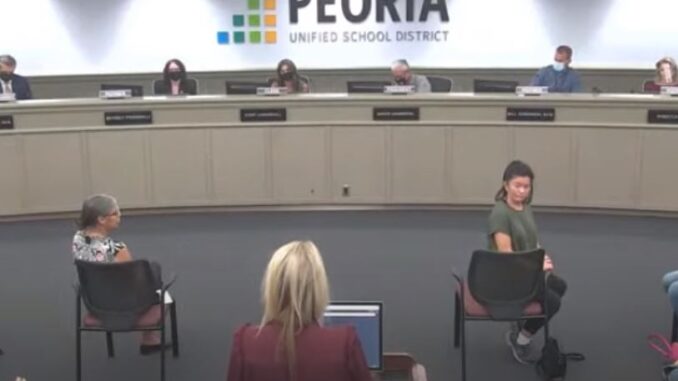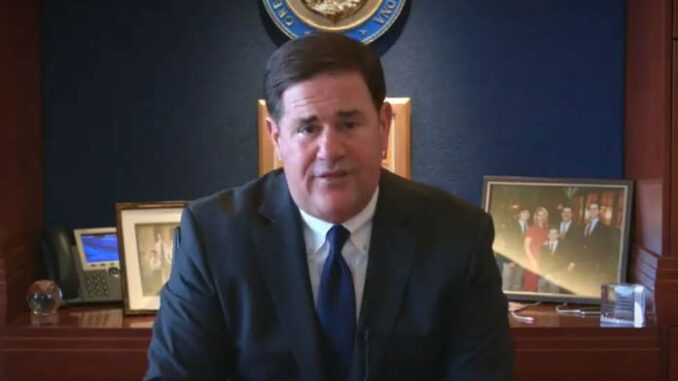
by Terri Jo Neff | Oct 19, 2021 | News
By Terri Jo Neff |
Last week’s announcement that Arizona Corporation Commissioner Justin Olson is joining the already crowded list of Republicans seeking the party’s nomination to take on U.S. Senator Mark Kelly in November 2022 is drawing attention to the basic economic reality of supply and demand.
Olson’s jump into the race occurred as several of his opponents filed their Third Quarter 2021 campaign committee report of receipts and expenditures.
One of those is Jim Lamon, a utility company executive and political newcomer who reported nearly $133,000 in contributions in Q3. That brought his total campaign receipts to $356,363 as of Sept. 30, nearly 90 percent of Lamon’s contributions have come from WinRed, a Virginia-based political action committee which distributes earmarked contributions to candidates and committees.
His Q3 report also lists $5 million in loans to the campaign which Lamon has guaranteed. As of Sept. 30, the campaign has spent more than $1.7 million. The ability to self-finance his campaign means Lamon, has more time to spent at in-person events in an effort increase his name recognition.
Mick McGuire, Arizona’s recently retired Arizona National Guard adjutant general, submitted his Q3 report showing $200,404 in new contributions, for a campaign total of about $427,000. Of that, more than $155,000 came from WinRed.
McGuire has also made or guaranteed almost $2.5 million in loans to his campaign since it started, of which $49,500 was dated in Q3. The campaign spent about $335,000 during Q3, nearly 93 percent of all disbursements to date.
Another candidate, Arizona Attorney General Mark Brnovich, listed just under $559,000 in new contributions in his Q3 report, upping his campaign total to almost $1 million as of Sept. 30. Of that, more than $620,000 has come from WinRed. Brnovich also reported disbursements through Sept. 30 of $486,760.
Another 13 Republicans have announced plans to vie for the nomination to challenge Kelly but none are seen as viable candidates. Although there have been few public endorsements yet for the Republican candidates for U.S. Senate, the Q3 reports offered a few clues as to current support.
According to Brnovich’s Q3 filing, he has received contributions from Mike Bailey, the former U.S. Attorney for the District of Arizona, as well as the Otoe Missoura Tribe of Oklahoma, while Lamon reported contributions from Senate Audit Liaison Ken Bennett and Look Ahead America’s Executive Director Matt Braynard.
McGuire’s report shows financial support from Kathleen Winn of the Maricopa County Community College District and venture capitalist Todd Belfer. However, Masters has the most impressive supporter thanks to his boss, billionaire and PayPayl founder Peter Thiel.
It is Thiel who contributed $10 million to a political action committee called Saving Arizona to support candidates like Masters.

by Corinne Murdock | Oct 19, 2021 | Education, News
By Corinne Murdock |
Matt Salmon, a Republican gubernatorial candidate and former U.S. Representative for Arizona’s fifth district, asked the Arizona School Board Association (ASBA) to disaffiliate from the National School Board Association (NSBA). His request was prompted by the NSBA’s move against parents protesting and challenging their school boards; the organization asked the Biden Administration in a letter to investigate those parents for “hate group” activity and potential “domestic terrorism.”
Attorney General Merrick Garland complied; he promised that the FBI was on the case.
In his letter to ASBA, Salmon reasoned that ASBA shouldn’t support the NSBA’s attempt to have the Biden Administration intimidate parents by investigating them for domestic terrorism.
“[I]t has become crystal clear to the American people that NSBA’s real problem is with everyday parents who are not okay with what is happening in our classrooms,” wrote Salmon. “The bottom line is that I find NSBA’s antagonistic posturing toward concerned parents to be deeply inappropriate and frankly un-American.”
Salmon also asked the ASBA if they consulted about the NSBA’s letter to President Joe Biden ahead of its submission. If they did, he requested to know if they helped edit it.
“I am proud to stand with each and every parent who cares enough to get into this fight for a brighter future, and I hope that efforts will be made by ASBA to reaffirm support for civic engagement in local school board meetings, which cannot be properly achieved until you sever your partnership with NSBA and the poor judgment of its leaders,” concluded Salmon.
Salmon told ASBA that they wouldn’t be leading the pack when it came to withdrawing from the NSBA, noting that Pennsylvania did so last week. He also cited how both Louisiana and Florida’s state chapters condemned the NSBA’s letter.
“TODAY I wrote a letter urging @AzSBA to take immediate steps to withdraw its affiliation with @NSBAPublicEd,” wrote Salmon. “By attempting to intimidate concerned parents, NSBA has disqualified itself from enjoying the benefits of a formal relationship with Arizona.”
ASBA is no longer the only option for school board members. Last week, a coalition of Arizonans launched an alternative to ASBA: the Arizona Coalition of School Board Members (ACSBM). Unlike ASBA, ACSBM offers membership to parents and community members in addition to school board members, and they claim to offer the same caliber of resources and legislative advocacy that ASBA offers currently.
As of press time, ASBA hasn’t issued a public response to Salmon’s letter.
Corinne Murdock is a reporter for AZ Free News. Follow her latest on Twitter, or email tips to corinne@azfreenews.com.

by Terri Jo Neff | Oct 18, 2021 | News
By Terri Jo Neff |
On Sept. 14, Arizona Attorney General Mark Brnovich sued President Joe Biden in federal court, firing one of the first salvos against a plan to create a national rule forcing private companies with 100 or more employees to mandate COVID-19 vaccinations for their employees or face substantial fines for non-compliance.
Several other state attorneys general are also pushing back, not only threatening legal action but also clarifying to private business owners and their employees that there is no national vaccination mandate at this time.
Biden’s plan announced Sept. 9 would create an emergency rule issued by the U.S. Department of Labor’s Occupational Safety and Health Administration (OSHA). As of today, the closet the mandate has come to reality is an Oct. 12 draft of the emergency rule currently under review by the Office of Management and Budget.
Brnovich’s lawsuit contends a mandate against private businesses is one of the greatest infringements upon individual liberties and separation of powers ever attempted by a President. It also contends that at the same time millions of Arizonans would be forced to get vaccinated to keep their jobs, the White House is allowing throngs of undocumented immigrants into the state without any vaccination requirement.
Also named as defendants are U.S. Homeland Security Secretary Alejandro Mayorkas; U.S. Customs and Border Protection Acting Commissioner Troy Miller; and U.S. Immigration and Customs Enforcement Acting Commissioner Tae Johnson. There has been no response filed yet in the lawsuit which will be heard in the U.S. District Court in Phoenix.
Another of the attorneys general speaking out about Biden’s plan is Texas Attorney General Ken Paxton, who said the private employer mandate is “not the way the Constitution works” and that the White House doesn’t have the authority to impose such a rule.
Oklahoma Attorney General John O’Connor is another who is willing to follow Brnovich’s lead with litigation.
“In the event federal emergency rules are issued that place such an unlawful demand upon employers, our office will be joined by other state Attorneys General across the country to quickly sue and seek an injunction against any implementation or enforcement,” O’Connor stated, adding that any Oklahoma employer who mandates a COVID-19 vaccination does so at their own risk.
There is also Montana Attorney General Austin Knudsen, who wrote a letter to “All Montanans” on Oct. 14 with clarification on Biden’s plan.
“There has been a great deal of confusion following President Biden’s speech regarding vaccines and whether his speech trumps Montana law,” Knudsen wrote, adding that “no such rule or regulation is currently in effect.”
Knudson pointed out it is illegal under Montana state law to discriminate based on vaccination status. He also provided information on who citizens can report violations.
But before the Biden Administration can move closer to imposing a mandate the language of the OSHA rule must be published in the Federal Register for public comment. In the meantime, various legal challenges have been brought against the President over his order that federal workers and military members be vaccinated or risk losing their job.

by AZ Free News | Oct 18, 2021 | News
Governor Doug Ducey is committing an additional $5 million to help Arizona small businesses recover from the economic consequences of the pandemic and extreme weather conditions.
Governor Ducey launched the Back to Work Small Business Rehiring and Retention Program in August and has invested a total of $10 million in the program to support small, locally-owned businesses. Recipients of the first round of funding have been identified and distribution of funds has begun. Today’s additional funding from the Governor will fulfill outstanding requests from applicants.
“Small businesses are the backbone of Arizona’s economy, and we’re dedicated to helping them fully recover,” said Governor Ducey. “I’m optimistic today’s additional investment will help small businesses around the state bounce back from the countless challenges of this past year and build for the future. I thank the small business community for their resilience and their continued efforts to help Arizona emerge out of the pandemic stronger than ever.”
This year, wildfires, storms and flooding impacted small businesses’ operations and employment opportunities. The Small Business Rehiring and Retention Program is designed to assist small, locally owned or operated businesses hire and retain employees and continue to recover from the effects of the pandemic and extreme weather conditions, like wildfires and flooding.
The Arizona Center for the Blind and Visually Impaired is a recipient of the first round of funding. The Center works with clients to help them achieve independence and develop the skills needed to go to work, go to school and actively participate in society.
“Our team is thrilled to receive funding that will help us continue to support and empower Arizonans experiencing vision loss,” said Steve Tepper, executive director of the Arizona Center for the Blind and Visually Impaired and member of the Governor’s Council on Blindness and Visual Impairment. “Visually impaired individuals and their loved ones deserve to have access to effective resources and programs — and our incredible staff makes sure they get the help they need. My thanks goes to Governor Ducey for supporting the Arizona Center for the Blind and Visually Impaired and our efforts to help those with vision loss achieve their full potential.”
The program will fund up to $10,000 in expenditures for employee hiring/signing bonuses, relocation bonuses for employees that are moving to take an open position, and employee retention bonuses.
An Arizona business must meet certain eligibility requirements to receive funding. A business must be: owned and operated in the state of Arizona; incorporated before January 1, 2020; rent or lease a physical location in Arizona; and have between five and 25 total employees that work at the physical location. Eligible businesses in areas impacted by wildfires or floods may have up to 50 employees.
The Small Business Rehiring and Retention Program is a component of Governor Ducey’s “Arizona Back to Work” plan, which supports Arizonans getting back to work and filling the thousands of jobs available across the state.

by Corinne Murdock | Oct 17, 2021 | News
By Corinne Murdock |
Facebook admitted to aiding human smuggling across the border, according to Arizona Attorney General Mark Brnovich. Brnovich submitted an inquiry letter at the end of June, asking Facebook about reports that coyotes (human smugglers) and drug cartels use their platform to advertise human smuggling across the border for purposes of illegal entry and sex trafficking.
In a response at the end of August, Facebook stated that while they do prohibit posts offering smuggling services, they do allow content that instructs people how to enter the country illegally or offers further information about how to be smuggled. The social media giant defended this approach as compromise allowing illegal immigrants information on asylum-seeking while minimizing human trafficking exploitation. Facebook cited “human rights experts” as their guide on this matter. The social media giant didn’t address concerns of sex trafficking in its response letter.
“We have been working diligently to proactively remove content related to drug trafficking or promoting human smuggling services from our platform. As an initial matter, our policies prohibit the use of our services for illegal purposes. Our Terms of Service make clear that individuals who violate our policies may be subject to penalties, including but not limited to, having their accounts banned. We don’t allow […] criminal organizations to operate on our platform. We remove posts and reject ads when we see this kind of behavior to keep people safe. We also prohibit sharing content that offers to provide or facilitate human smuggling, which includes advertising a human smuggling service. We do allow people to share information about how to enter a country illegally or request information about how to be smuggled. After consultation with human rights experts, we developed this policy to ensure we were prohibiting content relating to the business of human smuggling but not interfering with people’s ability to exercise their right to seek asylum, which is recognized in international law. Allowing people to seek and share information related to smuggling can also help minimize the likelihood of them being exploited by human traffickers.” (emphasis added)
On Thursday, Brnovich asked U.S. Attorney General Merrick Garland to investigate Facebook for admitting to facilitating and encouraging human smuggling.
“[O]ur office requests that your Department investigate Facebook’s facilitation of human smuggling at Arizona’s southern border and stop its active encouragement and facilitation of illegal entry,” wrote Brnovich.
In a press release, Brnovich claimed that Facebook’s actions spoke to a larger issue with Big Tech: a flagrant contempt for the law coupled with the desire to retain its power and profit.
“This is another example of how out of touch Big Tech is with America,” asserted Brnovich. “The cartels are seizing control of our southern border, and shame on anyone who is exploiting this crisis to enrich themselves.”
In their response letter, Facebook referenced its policy prohibiting individuals from “facilitating, organizing, promoting, or admitting to certain criminal or harmful activities targeted at people, businesses, property, or animals.” Their only allowance concerns debate, advocacy, and spreading awareness about harmful or criminal activities.
“In an effort to prevent and disrupt offline harm and copycat behavior, we prohibit people from facilitating, organizing, promoting or admitting to certain criminal or harmful activities targeted at people, businesses, property or animals. We allow people to debate and advocate for the legality of criminal and harmful activities, as well as draw attention to harmful or criminal activity that they may witness or experience as long as they do not advocate for or coordinate harm.”
One of the most recent famous examples of this policy in action was when the social media giant banned previous President Donald Trump for “his praise” of the “violence” that occurred on January 6. The ban was indefinite at first, but was later shortened to a period of two years upon further review.
Corinne Murdock is a reporter for AZ Free News. Follow her latest on Twitter, or email tips to corinne@azfreenews.com.

by Corinne Murdock | Oct 16, 2021 | News
By Corinne Murdock |
Raytheon’s employees at their Tucson headquarters are resisting the defense company’s COVID-19 vaccine mandate. On Thursday, a group protested outside of the headquarters.
The protesting employees have created a website to give fellow employees information on their rights, options, and samples of religious exemption letters that were accepted by Raytheon, as well as any updates and legal or legislative news.
All of the accepted religious exemption letters cited an objection to the vaccine’s development using fetal cell lines or tissues, from the perspective of the Catholic or Christian faiths.
Project Veritas, an outlet construed as “far-right” that specializes in investigative and undercover reporting, discovered via internal emails from a whistleblower that Pfizer had attempted to hide the fact that aborted fetal cell lines and tissues were used in the development of mRNA vaccines.
The Raytheon employees also included letters to the FDA from Dr. Patricia Lee and her legal representation, Siri & Glimstad. As an emergency room doctor for over 15 years, Lee attested that she’d never before seen the number of vaccine injuries that she’s witnessed from the COVID-19 vaccine. Lee said these injuries were serious, often fatal: transverse myelitis resulting in quadriplegia (inflammation on both sides of the spinal cord, resulting in paralysis of all four limbs), pneumocystis pneumonia (a type of pneumonia normally only seen with weakened immune systems, usually HIV/AIDS patients or those taking immunosuppressants), multi-system organ failure, cerebral venous sinus thrombosis (blood clots in the brain), postpartum hemorrhagic shock and septic shock (life-threatening issues following birth), and disseminated CMV and CMV viremia (flu-like symptoms, most common in immunosuppressed patients).
“It appears statistically improbable that any one physician should witness this many COVID-19 vaccine injuries if the federal health authority claims regarding Covid-19 vaccine safety were accurate,” asserted Lee.
Lee also claimed that many of her colleagues are also reporting similar issues.
According to the employees, Raytheon also pushed up their vaccination deadline. Originally, the deadline was New Year’s Eve. Now, Raytheon wants all employees to comply by December 8.
One Raytheon employee appeared in a radio interview with The Conservative Circus. He explained that Raytheon can’t afford to lose employees over their vaccine mandate. According to the employee, “Ernie,” the company’s Tucson headquarters hosted a job fair recently where around 3,000 people showed up. Out of all those applicants, two or three were offered a job: most didn’t have the qualifications or couldn’t get the security clearances.
“I don’t know what they’re going to do and why they think this is going to be a good thing,” said Ernie.
Ernie also disclosed that no talks about vaccine mandates were ever occurring prior to the Biden Administration. He also revealed that half of the people who recently got sick from COVID-19 were breakthrough cases – they were vaccinated.
Ernie also revealed that Raytheon was asking invasive questions concerning religious exemption requests. These included: how often do you attend worship services? Do you abstain from taking other medicines that were possibly developed from aborted fetal cell lines or tissues?
Early last month, President Joe Biden issued a mandate requiring any companies with over 100 employees to either have their workforce vaccinated or subjected to frequent testing.
This latest mandate from Biden may follow the patterns of another vaccine-related mandate: earlier this year, Biden required all federal employees and contractors to either be vaccinated or subjected to frequent testing. With this latest mandate, Biden dropped the option of frequent testing – now, federal employees must be vaccinated.
Raytheon’s other deadline for employees for disclosure was on Friday. There are approximately 13,000 employees at the Tucson headquarters.
Corinne Murdock is a reporter for AZ Free News. Follow her latest on Twitter, or email tips to corinne@azfreenews.com.






